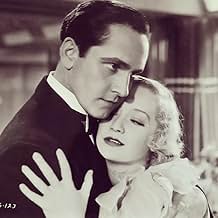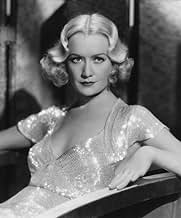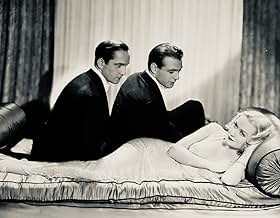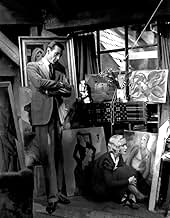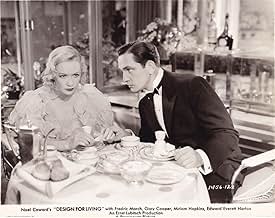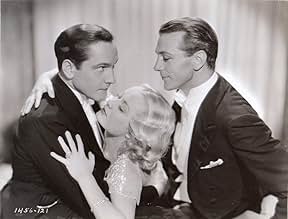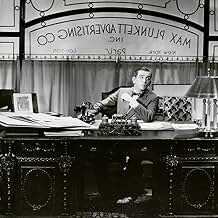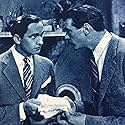IMDb RATING
7.4/10
8.3K
YOUR RATING
A woman cannot decide between two men who love her, and the trio agree to try living together in a platonic friendly relationship.A woman cannot decide between two men who love her, and the trio agree to try living together in a platonic friendly relationship.A woman cannot decide between two men who love her, and the trio agree to try living together in a platonic friendly relationship.
- Director
- Writers
- Stars
- Awards
- 3 wins total
Cosmo Kyrle Bellew
- Man
- (uncredited)
Lionel Belmore
- Theatre Patron
- (uncredited)
Thomas Braidon
- Douglas' Second Manager
- (uncredited)
Nora Cecil
- Tom's Secretary
- (uncredited)
Emile Chautard
- Train Conductor
- (uncredited)
Mathilde Comont
- Heavy Woman
- (uncredited)
Adrienne D'Ambricourt
- Cafe Proprietress
- (uncredited)
James Donlan
- Fat Man with Ring
- (uncredited)
Harry Dunkinson
- Mr. Egelbauer
- (uncredited)
Estelle Etterre
- Woman in audience
- (uncredited)
- Director
- Writers
- All cast & crew
- Production, box office & more at IMDbPro
Featured reviews
This was one of the movies I was so sure was going to be stupid and annoying but it turned out to be such fine comedy I've already watched it three times in the past week or two. So many good lines. Tom writes a play called Goodnight Bassington - a comedy in about three acts with a tragic ending. George paints Lady Godiva on a bicycle, despite the fact that a bicycle seat IS a little hard on her historical background. Gilda says that she went to see the above-mentioned painting of Lady Godiva with a friend. "She loved it. We haven't spoken since," Gilda tells George, who begins to pout. He does a fair amount of pouting throughout the film.
Eaglebauer also makes for some fine humour in some scenes near the end, but we never get to see the man. We only hear him bellowing out a joyous song about "falling leaves and fading trees! Goodbye, summer, goodbye!"
But besides all that this really wacky movie is a delight and I sure wish they'd re-release it because it's so good.
So. There's only one thing I have to say to you. Immorality may be fun, but it's not fun enough to replace one hundred per cent virtue and three square meals a day.
Eaglebauer also makes for some fine humour in some scenes near the end, but we never get to see the man. We only hear him bellowing out a joyous song about "falling leaves and fading trees! Goodbye, summer, goodbye!"
But besides all that this really wacky movie is a delight and I sure wish they'd re-release it because it's so good.
So. There's only one thing I have to say to you. Immorality may be fun, but it's not fun enough to replace one hundred per cent virtue and three square meals a day.
Intelligent script, witty dialogue, sexy stars, sophisticated story, deft direction…What more can I say? It's Lubitsch and Paramount at its Pre-Code best! This was another of those "vintage" films of which you had the chance of reading a lot about, but before Universal released "The Gary Cooper Collection", where it's included, you had nowhere to watch it. Of course, I bought promptly the aforementioned set.
The picture tells the story of free-spirited Gilda Farrell, a young lady who works at a Parisian Advertising Agency, managed by that great seasoned pro, Edward Everett Horton, who by chance meets on board a train, struggling, penniless, artists George Curtis, a painter (Gary Cooper) and Thomas Chambers, a playwright (Fredric March), in which may be one of the most "risqué" plots of all the Pre-Code Era, dealing openly with the pros and cons of a mènage-a-trois.
Miriam Hopkins portrays the deliciously mischievous Gilda, giving a top, tongue-in-cheek performance, looking absolutely beautiful and full of glow from within; it's really in her films directed by Lubitsch that her appeal shines at its most and she looks at her attractive-best.
Fredric March is good too as the "more down-to-earth-but-nevertheless-madly-in-love" playwright, who lives with buddy Gary Cooper in a miserable tenement, until Miriam Hopkins comes in scene and to "the rescue".
But the revelation, in my opinion, is Gary Cooper; after seeing him in many of his 1930s films, I feel that I like him best in the variety of roles he got to play in those years: a young idealist in "Peter Ibbetson", a sensitive soldier in "A Farewell to Arms", a sophisticated artist in this one, etc. He really was a good actor from the beginning of his "talkies" career (I haven't seen his Silents, so I cannot give an opinion), showing much skill and depth in his interpretations. In this film he plays excellently opposite such strong talents as Miriam Hopkins and Fredric March, absolutely "a la par".
In all, a highly enjoyable film. Smart Entertainment. A must.
The picture tells the story of free-spirited Gilda Farrell, a young lady who works at a Parisian Advertising Agency, managed by that great seasoned pro, Edward Everett Horton, who by chance meets on board a train, struggling, penniless, artists George Curtis, a painter (Gary Cooper) and Thomas Chambers, a playwright (Fredric March), in which may be one of the most "risqué" plots of all the Pre-Code Era, dealing openly with the pros and cons of a mènage-a-trois.
Miriam Hopkins portrays the deliciously mischievous Gilda, giving a top, tongue-in-cheek performance, looking absolutely beautiful and full of glow from within; it's really in her films directed by Lubitsch that her appeal shines at its most and she looks at her attractive-best.
Fredric March is good too as the "more down-to-earth-but-nevertheless-madly-in-love" playwright, who lives with buddy Gary Cooper in a miserable tenement, until Miriam Hopkins comes in scene and to "the rescue".
But the revelation, in my opinion, is Gary Cooper; after seeing him in many of his 1930s films, I feel that I like him best in the variety of roles he got to play in those years: a young idealist in "Peter Ibbetson", a sensitive soldier in "A Farewell to Arms", a sophisticated artist in this one, etc. He really was a good actor from the beginning of his "talkies" career (I haven't seen his Silents, so I cannot give an opinion), showing much skill and depth in his interpretations. In this film he plays excellently opposite such strong talents as Miriam Hopkins and Fredric March, absolutely "a la par".
In all, a highly enjoyable film. Smart Entertainment. A must.
I'm not a big fan of the Lubitsch Touch. This, which I hadn't seen in 20 years, I think is my favorite.
The recent Broadway revival of the Noel Coward play, which was supposedly very ooh-la-la and daring, was a bust. Interminable and misguided.
One problem was that the female lead was made very cold. In the movie, Miriam Hopkins is just right: pretty, seductive, witty.
Gary Cooper is sublime. He was a great comedian -- equally good in "Desire," the delightful movie with Dietrich that Lubitsch produced and supposedly had a big hand in directing. Too bad he changed gears so drastically and became the strong, silent Western hero he's known for today (if he's known at all, alas.)
Fredric March was a very fine actor but not a comedian. He is the weakest link; but he works well in the ensemble.
Edward Everett Horton is funny, as always.
It really works, and is as racy today as it must have been when it came out.
The recent Broadway revival of the Noel Coward play, which was supposedly very ooh-la-la and daring, was a bust. Interminable and misguided.
One problem was that the female lead was made very cold. In the movie, Miriam Hopkins is just right: pretty, seductive, witty.
Gary Cooper is sublime. He was a great comedian -- equally good in "Desire," the delightful movie with Dietrich that Lubitsch produced and supposedly had a big hand in directing. Too bad he changed gears so drastically and became the strong, silent Western hero he's known for today (if he's known at all, alas.)
Fredric March was a very fine actor but not a comedian. He is the weakest link; but he works well in the ensemble.
Edward Everett Horton is funny, as always.
It really works, and is as racy today as it must have been when it came out.
10reelguy2
Miriam Hopkins finds herself in love with both Gary Cooper and Fredric March (who can blame her?), so she does what any sensible Pre-Code woman would do: she decides to live with both of them!
It's a tribute to movie audiences of the early 1930s that a sophisticated comedy like Design for Living could a.) Get produced, and b.) Be a success at the box office. The dumbing down of current films means that the delicious innuendo in Design for Living would go over the head of most of today's audience.
The key to the Lubitsch Touch was in the perfect timing of physical gestures and the delivery of the lines. Trouble in Paradise and Design for Living were the best in this respect. Personally, I prefer the lack of music in Design for Living. I think it dates the film less than Lubitsch's other efforts.
I don't mind that Ben Hecht wrote most of the film's dialog rather than Noel Coward, who wrote the original play. All I know is that the dialog is very very funny and quite naughty, making this the ultimate Pre-Code film.
Miriam Hopkins could do no wrong in a Lubitsch film, and her work here is brilliant. She's intelligent and uncompromisingly honest. Her leading men, Gary Cooper and Fredric March, are both sexy and hilarious. Gary Cooper is a particular revelation, displaying a flair for comedy that is quite unexpected. As Cooper's friend and rival for the affection of Hopkins, March is also very funny, which comes as no surprise after his brilliant parody of John Barrymore in The Royal Family of Broadway (1930).
Prepare to laugh yourself silly during what may be the funniest film ever made.
It's a tribute to movie audiences of the early 1930s that a sophisticated comedy like Design for Living could a.) Get produced, and b.) Be a success at the box office. The dumbing down of current films means that the delicious innuendo in Design for Living would go over the head of most of today's audience.
The key to the Lubitsch Touch was in the perfect timing of physical gestures and the delivery of the lines. Trouble in Paradise and Design for Living were the best in this respect. Personally, I prefer the lack of music in Design for Living. I think it dates the film less than Lubitsch's other efforts.
I don't mind that Ben Hecht wrote most of the film's dialog rather than Noel Coward, who wrote the original play. All I know is that the dialog is very very funny and quite naughty, making this the ultimate Pre-Code film.
Miriam Hopkins could do no wrong in a Lubitsch film, and her work here is brilliant. She's intelligent and uncompromisingly honest. Her leading men, Gary Cooper and Fredric March, are both sexy and hilarious. Gary Cooper is a particular revelation, displaying a flair for comedy that is quite unexpected. As Cooper's friend and rival for the affection of Hopkins, March is also very funny, which comes as no surprise after his brilliant parody of John Barrymore in The Royal Family of Broadway (1930).
Prepare to laugh yourself silly during what may be the funniest film ever made.
10capel
Few films have had as much nonsense written about them as Ernst Lubitsch's "Design For Living." From the moment it was released, it was criticized for rewriting Noel Coward's then-daring play (Ben Hecht, the screenwriter, said: "There's only one line of Coward's left in the picture--see if you can find it!"); for casting Americans in parts that had originally been played by Coward, Alfred Lunt, and Lynn Fontanne; for toning down the gay subtexts of Coward's play. All that is, of course, completely irrelevant; the question is not whether the play is faithful to the source material, but whether it's good. And it is, it is.
There are flaws in the film. This was one of the first times Lubitsch had made a movie with little or no music on the soundtrack; previously, in his musicals and his sublime "Trouble In Paradise," he had used background music to cover up potential dead spots and carry the film along. Here there is none of that, with the result that some of the early scenes seem oddly paced. But the wit of the script (written by Hecht but, as always with Lubitsch, carefully supervised and contributed to by the director himself) and the appeal of the performers (more about them later) pull the film through the occasional rough spots, and the second half of the movie is just about perfect.
Another idiotic thing that is often said about "Design For Living" is that Lubitsch and Hecht rewrote Coward due to fear of the censors. In fact, the censors must have had a heart attack when they saw "Design," for this is one of the most sexually frank of the pre-Code Hollywood movies; premarital sex, cohabitation, adultery and frigidity are all clearly portrayed-- but, as always with Lubitsch, they are implied rather than shown. Lubitsch's trademark door and blackout gags are here, and they are hilarious; again, it's not Noel Coward--it's Lubitsch, the cinema's greatest comic filmmaker at the peak of his powers.
But there's something else here that isn't found in most Lubitsch films, and it comes from Ben Hecht, whose cynical, fast-talking, very American style of writing gives the characters a flavor quite unlike the more Continental wit of Lubitsch's usual heroes. (This is also one of the few Lubitsch films where the lead characters are American rather than European.) Critics have sometimes complained that Hecht's somewhat inelegant style was unworthy of either Coward or Lubitsch. Again, I disagree; the moments of Hechtian farce (like the hilarious party scene) are beautifully handled by Lubitsch and turn the film into a forerunner of screwball comedy, the place where Continental charm and hard-driving Americanism meet.
Now to the actors. The "British is Better" attitude of many critics made it inevitable that Lubitsch's American cast would be pilloried. Again, this is not Noel Coward and a Noel Coward style of acting wouldn't work in this context. All the leading players are actually quite wonderful: Miriam Hopkins, one of Lubitsch's favorite actresses, has the best role and gives a marvelously energetic performance as the flighty, pretentious free spirit who tries to substitute art for sex; Gary Cooper is at the height of his youthful charm, with a surprisingly light comic touch and great teamwork with Fredric March. March, who can often be heavy-handed in film comedy, is here charming and funny; it's a tribute to Lubitsch that he got such a genial performance out of him. And, of course, there's Edward Everett Horton, one of Hollywood's finest character actors in one of his finest roles.
If you know and love the Noel Coward play, don't expect this movie to be a faithful adaptation. Think of it as an original work of comedic art that happens to utilize some of the story elements of Coward's play. It's not Noel Coward; it's a splendid romantic farce that, like all great comedies, has serious themes underneath the fun: Sexual freedom, male vs. female roles in society, art, love, friendship. So see it (if you can; it's not on video, alas). It's not Noel Coward, it's Ernst Lubitsch, and despite the occasional flaws, it's Lubitsch at his best.
There are flaws in the film. This was one of the first times Lubitsch had made a movie with little or no music on the soundtrack; previously, in his musicals and his sublime "Trouble In Paradise," he had used background music to cover up potential dead spots and carry the film along. Here there is none of that, with the result that some of the early scenes seem oddly paced. But the wit of the script (written by Hecht but, as always with Lubitsch, carefully supervised and contributed to by the director himself) and the appeal of the performers (more about them later) pull the film through the occasional rough spots, and the second half of the movie is just about perfect.
Another idiotic thing that is often said about "Design For Living" is that Lubitsch and Hecht rewrote Coward due to fear of the censors. In fact, the censors must have had a heart attack when they saw "Design," for this is one of the most sexually frank of the pre-Code Hollywood movies; premarital sex, cohabitation, adultery and frigidity are all clearly portrayed-- but, as always with Lubitsch, they are implied rather than shown. Lubitsch's trademark door and blackout gags are here, and they are hilarious; again, it's not Noel Coward--it's Lubitsch, the cinema's greatest comic filmmaker at the peak of his powers.
But there's something else here that isn't found in most Lubitsch films, and it comes from Ben Hecht, whose cynical, fast-talking, very American style of writing gives the characters a flavor quite unlike the more Continental wit of Lubitsch's usual heroes. (This is also one of the few Lubitsch films where the lead characters are American rather than European.) Critics have sometimes complained that Hecht's somewhat inelegant style was unworthy of either Coward or Lubitsch. Again, I disagree; the moments of Hechtian farce (like the hilarious party scene) are beautifully handled by Lubitsch and turn the film into a forerunner of screwball comedy, the place where Continental charm and hard-driving Americanism meet.
Now to the actors. The "British is Better" attitude of many critics made it inevitable that Lubitsch's American cast would be pilloried. Again, this is not Noel Coward and a Noel Coward style of acting wouldn't work in this context. All the leading players are actually quite wonderful: Miriam Hopkins, one of Lubitsch's favorite actresses, has the best role and gives a marvelously energetic performance as the flighty, pretentious free spirit who tries to substitute art for sex; Gary Cooper is at the height of his youthful charm, with a surprisingly light comic touch and great teamwork with Fredric March. March, who can often be heavy-handed in film comedy, is here charming and funny; it's a tribute to Lubitsch that he got such a genial performance out of him. And, of course, there's Edward Everett Horton, one of Hollywood's finest character actors in one of his finest roles.
If you know and love the Noel Coward play, don't expect this movie to be a faithful adaptation. Think of it as an original work of comedic art that happens to utilize some of the story elements of Coward's play. It's not Noel Coward; it's a splendid romantic farce that, like all great comedies, has serious themes underneath the fun: Sexual freedom, male vs. female roles in society, art, love, friendship. So see it (if you can; it's not on video, alas). It's not Noel Coward, it's Ernst Lubitsch, and despite the occasional flaws, it's Lubitsch at his best.
Did you know
- TriviaConsiderable censorship difficulties arose because of sexual discussions and innuendos, although the Hays Office eventually approved the film for release. However, the film was banned by the Legion of Decency and was refused a certificate for re-release by censor Joseph Breen in 1934 when the Production Code was more rigorously enforced.
- GoofsCamera shadow visible on window frame as Gilda sets the table.
- Quotes
Max Plunkett: Immorality may be fun, but it isn't fun enough to take the place of one hundred percent virtue and three square meals a day.
- ConnectionsFeatured in Complicated Women (2003)
- SoundtracksThe Star Spangled Banner
(1814) (uncredited)
Music by John Stafford Smith
Hummed by Gary Cooper and Fredric March
Details
- Release date
- Country of origin
- Languages
- Also known as
- Una mujer para dos
- Filming locations
- Production company
- See more company credits at IMDbPro
Box office
- Gross worldwide
- $157
- Runtime
- 1h 31m(91 min)
- Color
- Aspect ratio
- 1.33 : 1
Contribute to this page
Suggest an edit or add missing content


